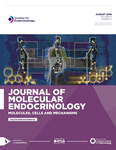Zanthoxylum alkylamides ameliorate protein metabolism disorder in STZ-induced diabetic rats
- 1College of Food Science, Southwest University, Chongqing, China
- 2Laboratory of Quality & Safety Risk Assessment for Agro-products on Storage and Preservation (Chongqing), Ministry of Agriculture, Chongqing, China
- 3Institute of Biological Engineering, Chongqing University, Chongqing, China
- 4Department of Nutrition, Daping Hospital & Research Institute of Surgery, Third Military Medical University, Chongqing, China
- Correspondence should be addressed to J Kan; Email: kanjianquan{at}163.com
Abstract
This study aimed to evaluate the protein metabolism effect of Zanthoxylum alkylamides and to explore the potential mechanism in streptozotocin (STZ)-induced diabetic rats. Diabetic rats were orally treated with 2, 4 and 8 mg per kg bw of alkylamides daily for 28 days. Alkylamides decreased the relative weight of the liver and food intake, significantly increased the relative skeletal muscle weight and significantly decreased the blood urea nitrogen levels. Insulin, insulin-like growth factor 1, total protein (TP) and albumin (ALB), globular proteins and ALB proteins/globulin protein levels in serum significantly increased. TP, RNA content and RNA/DNA ratio significantly increased in the skeletal muscle of diabetic rats. Real-time quantitative polymerase chain reaction results indicated that alkylamides significantly increased the mRNA expression of insulin receptor (InR), IGF1 and insulin-like growth factor 1 receptor (IGF1R) in the liver and skeletal muscle. Moreover, the mRNA and protein expression levels of PI3K, PKB and mTOR significantly increased, whereas those of atrogin-1, muscle ring finger 1 and FOXO in the skeletal muscle significantly decreased. Alkylamides may advance protein synthesis by the PI3K/PKB/mTOR signalling pathway and attenuate the catabolism of protein through the ubiquitin–proteasome pathway. Therefore, it was possible that alkylamides ameliorate protein metabolism disorders in diabetic rats by activating the mTOR pathway.
- Received 27 December 2016
- Accepted 18 January 2017
- Made available online as an Accepted Preprint 18 January 2017
- © 2017 The authors
 This work is licensed under a Creative Commons Attribution 3.0 Unported License.
This work is licensed under a Creative Commons Attribution 3.0 Unported License.











